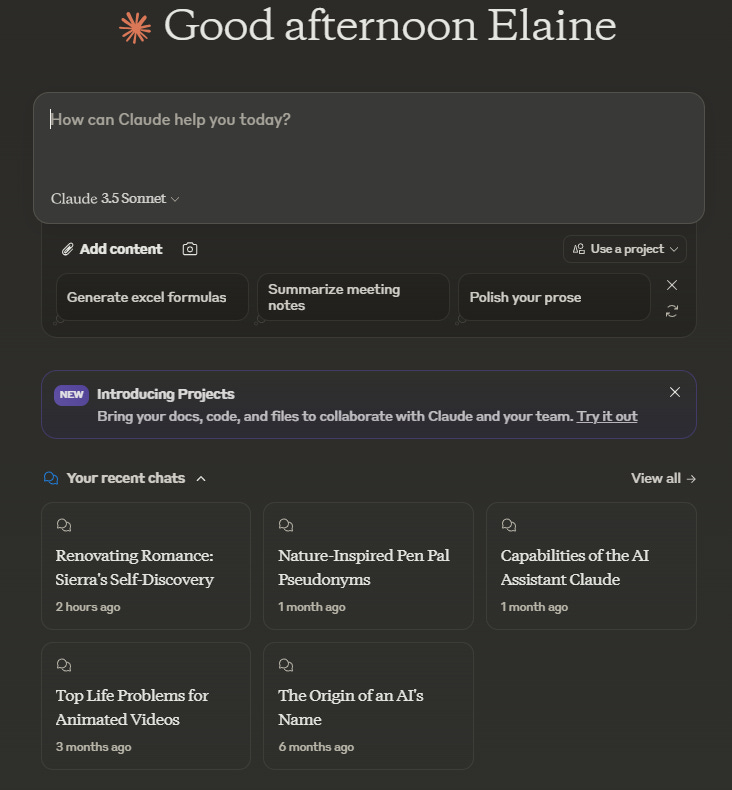(To read these posts in chronological order, visit our Table of Contents page.)
To make the most of The Writer’s AI Companion writing tutorials, both free and paid, you'll need access to Claude AI. You will learn how to accomplish that in this post.
But first, let’s see…
What Can AI Do For You As a Writer?
In post #1A, I mentioned that AI could revolutionize your writing process. Let me show you how. After countless hours working with AI on my own novels and stories, I've discovered 17 powerful ways it can transform your writing journey. And you don't need to be tech-savvy to use any of them.
Let me demonstrate with a real example from my current mystery novel. I was struggling with potential suspects for a murder disguised as death by natural causes. Within minutes of asking AI for help, I had twenty unique character concepts, complete with motives and backgrounds. But here’s the magic part—each suggestion sparked new ideas of my own, leading to plot twists I never would have considered.
17 Ways AI Can Help You With Your Writing
Here are 17 ways AI helps me. (There are more.) Each of these 17 ways lists only a few examples:
1. Idea Generation:
Brainstorm plot ideas (See Example 3 below)
Generate unique character concepts
Suggest interesting settings
Propose themes and tropes
2. Character Development:
Help with the main and secondary characters (See Example 2 below)
Create detailed character backgrounds
Develop character arcs (See Example 1 in Post 1)
Suggest character quirks and traits
Help with character relationships and dynamics
3. Plot Development:
Outline story structures
Suggest plot twists
Help with pacing issues (I got a lot of help from AI with the pacing of a short story I wrote)
Develop subplots
4. World-building:
Create detailed fictional worlds
Develop societal structures and cultures
Generate names for places, people, or things (You can also use Google for this one)
Suggest historical backgrounds for fictional settings
5. Dialogue:
Generate dialogue samples
Improve existing dialogue
Ensure consistent character voices
6. Description and Imagery:
Provide vivid descriptive passages
Suggest metaphors and similes (AI helped me with a character’s arc that paralleled her work.)
Help with sensory details
7. Genre-specific Elements:
Offer ideas for specific genres (e.g., mystery clues, romantic moments, sci-fi technology)
AI can teach you so much about your genre (e.g., typical reader, important tropes, etc.)
8. Writing Prompts:
Provide prompts to overcome writer’s block
Suggest exercises to improve specific writing skills
AI can help you improve anything you’ve written or are trying to write
9. Editing and Revision:
Analyze pacing and story structure
Identify plot holes or inconsistencies (These are things we don’t recognize on our own.)
Suggest areas for improvement (I use this all the time!)
10. Research Assistance:
Provide information on various topics relevant to your story
Point out areas that might need more research
11. Literary Techniques:
Suggest ways to use foreshadowing, symbolism, irony, etc.
Help with tricky narrative techniques like flashbacks or multiple POVs
12. Style and Voice:
Analyze your writing style
Suggest ways to strengthen your unique voice
13. Feedback and Critique:
Provide constructive feedback on excerpts (This is hugely valuable.)
Highlight strengths and areas for improvement
14. Problem-solving:
Help work through difficult plot points or character dilemmas (AI can help if you paint your story into a corner.)
Suggest solutions for writer’s block (This saves us time and frustration!)
15. Market Trends:
Provide information on current trends in fiction writing
Suggest ways to make your work marketable while maintaining your vision
AI can write compelling blurbs
16. Comparative Analysis:
Compare your ideas or writing to established works for insight
17. Emotional Guidance:
Suggest ways to evoke specific emotions in readers
Help with portraying complex emotional situations
The beauty of using AI in this way is that it works for any genre. Whether you’re writing romance, fantasy, literary fiction, or anything else, AI can help you develop your ideas while maintaining your unique voice.
The Value of Your Time
Imagine having a very intelligent writing coach and an imaginative brainstorming partner who can help you with endless ideas and suggestions for building and improving your stories and other writing.
On top of that, imagine that this experienced writing partner is available to you 24/7/365 whenever you are stuck with your writing project.
How much would you pay for a writing coach who is always available and can do all these things and more?
If I told you that you could have all this help—any time of the day or night, weekends and holidays—for 70 cents a day, would you consider that a good value? …I do!
Why I Use Claude AI Instead of ChatGPT
I started my AI journey with ChatGPT and loved it. During the free beta stage, I learned how to craft effective prompts and get valuable writing assistance. When ChatGPT introduced paid plans, I happily subscribed because having 24/7 writing help for 70 cents a day was a bargain.
Then I discovered Claude AI 3.5 Sonnet. After testing both platforms specifically for fiction writing, I found Claude's responses more professional and helpful for my creative writing.
While I'm grateful for what I learned with ChatGPT, Claude has become my go-to AI writing partner.
NOTE: When I first started using AI, these programs could access the internet in real time. That’s different now due to plagiarism concerns. Nevertheless, Claude is updated regularly and so full of information that it’s impossible to exhaust its wealth of knowledge.
Also, be aware that we do not have unlimited access to Claude daily, but I find that the amount of information I get each day is more than enough to help me improve my fiction writing. I almost never run out of time with Claude because the product owners have made great strides in solving this issue.
I teach you how to make your prompts efficient and focused on what you need. So, although we want to plan our prompts wisely, we don’t want to hesitate to carry on useful conversations with Claude that will help us develop our writing skills and leap forward with our stories.
How to Sign Up with Claude 3.5 Sonnet Pro
Anthropic created Claude AI, so the best place to get the latest information is on the anthropic.com website:
On the Anthropic home page, find this box:
Ask Claude AI a Few Questions for Free
If you are signing up for the first time, you can ask a few questions for free. Ask something about writing or your characters in particular. If you’re a fiction writer, ask some questions about your genre or describe your current book and ask for suggestions to make it more interesting.
Later, I’ll give lessons on crafting prompts that help you dig deep into your stories.
Then, sign up for one month of Claude 3.5 Sonnet Pro. If you decide this program is not for you, you can cancel anytime. But unless you stop writing altogether, this program can help you write anything better and faster.
Once you have your Claude AI 3.5 Pro account, tell Claude about your current writing project and ask a question in the same prompt. See Examples 1 and 2 in this post.
If You Already Have a Claude AI Pro Account
If you’ve already signed up for the Claude 3.5 Pro plan, you’ll be presented with a screen like this. Choose the project you’re working on or just type a new prompt into the top box:
Example 1: Here is an Easy Prompt About a Fictional Character
Let me show you how easy it is to start using Claude as your writing partner. Here's a real example from one of my early conversations with Claude:
MY PROMPT:
Claude, I'm writing a novel and my main character needs a unique occupation - something that would give her interesting skills and knowledge, but isn't commonly seen in fiction. Can you suggest some possibilities?
CLAUDE'S RESPONSE:
"Here are several unique occupations that could add depth to your character:
1. Industrial Scent Designer - Creates custom fragrances for retail stores, hotels, and products
2. Art Conservation Scientist - Uses chemistry to preserve historical artifacts
3. Urban Forager - Supplies wild-growing ingredients to high-end restaurants
4. Drone Traffic Management Specialist - Coordinates aerial delivery systems
5. Medical Illustrator - Creates detailed anatomical artwork for textbooks and surgeons
Each of these occupations would give your character specialized knowledge that could drive interesting plot points. Would you like me to explain the unique aspects of any of these roles?"
Example 2: A Simple Example of a Follow-up Prompt
Now that Claude suggested interesting occupations, let's dig deeper into one option.
MY FOLLOW-UP PROMPT:
The Art Conservation Scientist sounds interesting. What specific knowledge would they have that could add depth to my story?
CLAUDE'S RESPONSE:
"An Art Conservation Scientist would have fascinating knowledge including:
- Chemical analysis techniques
- Historical art methods and materials
- Authentication procedures
- Restoration techniques
- Preservation, environment control
They would also have access to:
- Museum back rooms
- Private collections
- Research laboratories
- International art networks
- Historical documentation"
Can you see how each response builds on the previous one? In just two quick exchanges, I had unique character possibilities I hadn't considered, plus specific details to make the character authentic.
Remember: This is just a basic example. If you don’t like any of the choices that Claude gives you, write another prompt, explaining why these ideas are not right for your book. Tell Claude why they won’t work and ask for additional choices. Don’t just say, “Give me more ideas.” If possible, give Claude a hint of what might work and let him work with this new information.
Are You Ready to Have an Amazing Writing Partner?
Here’s what you can do right now:
1. Subscribe for free: Don’t miss out on future tips and tricks! Hit the subscribe button below to get “The AI Writers Companion” delivered straight to your inbox.
2. Sign up for Claude AI 3.5 Sonnet: This will give you access to the many helpful features this language learning model can do for you. Claude is a very good option for fiction writers:
3. Spread the word: Do you know fellow writers who could use a boost? Please share this newsletter with them, and let’s grow our AI writing community together.
4. Stay tuned: In the next post of The Writer’s AI Companion, we’ll dive into more examples of how to use AI in your writing. You won’t want to miss it!
Coming In Future Posts
Over the next four months, you'll receive:
Every Tuesday (Free Posts)
A fundamental AI writing technique with a clear example and tip for immediate application. We'll explore how to use AI to help with:
Character creation essentials
Basic plot development
Story structure foundations
World-building basics
Scene crafting techniques
And many more elements of fiction writing
Every Thursday (Posts for Paid Subscribers)
A deep-dive into each topic, including using AI for:
Advanced writing strategies
Multiple AI prompts and responses
Suggested practice exercises
Downloadable summary and prompts used in each lesson
Downloadable worksheet(s)
Each paid post includes premium resources to help you implement what you've learned.
Next week, we'll dive into character development, where you'll learn:
How to create more compelling characters
Ways to develop unique personalities
Etc.
Join us on this AI writing journey. Whether you're starting your first novel or working on your fifth, you'll discover new ways to enhance your fiction writing using AI as your creative partner.
Until next time be creative,
-Elaine
P.S. Feel free to email me at Elaine@TheWrittenLink.com. Please put “Companion” in the subject line.
© Elaine Foster, The Writer’s AI Companion. Share freely with attribution.










